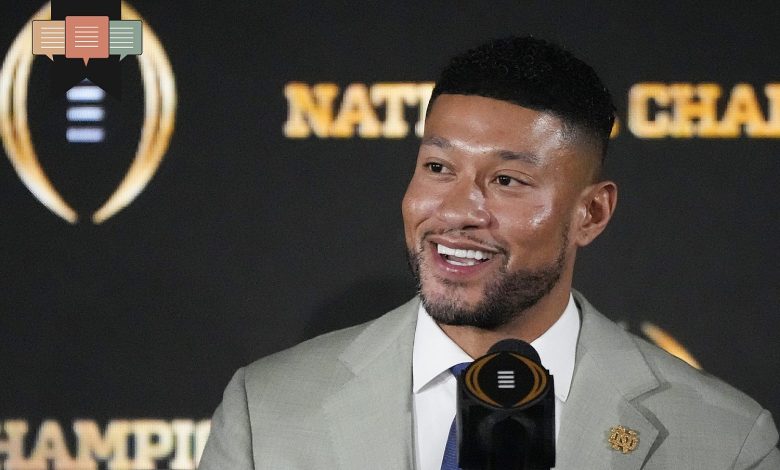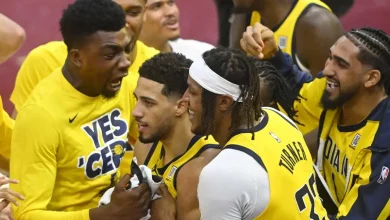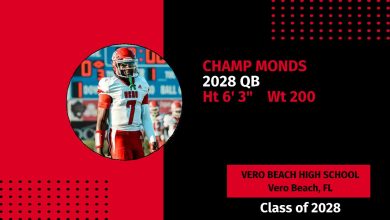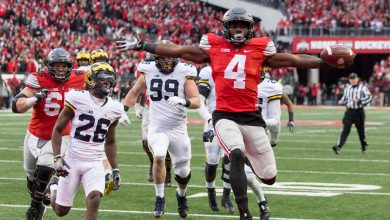Marcus Freeman’s Plan for Notre Dame to Break Through the National Championship Barrier

Notre Dame football has long been a symbol of excellence, tradition, and pride in college football. However, despite its storied history and wealth of talent, the Fighting Irish have been unable to break through the final barrier and win a national championship since 1988. For decades, the university has boasted one of the most respected programs in the country, but the elusive national title remains a distant goal. In recent years, under head coach Marcus Freeman, Notre Dame has come tantalizingly close, but has yet to secure that coveted championship.
Freeman, who took over the reins from Brian Kelly in 2021, is keenly aware of the weight of the task ahead. His mission is clear: to take the Fighting Irish from consistent contenders to national champions. Freeman’s approach is multifaceted, focusing on strengthening both the offensive and defensive sides of the team, fostering a culture of accountability, and recruiting top-tier talent that can compete with the elite programs of college football. Breaking through the national championship barrier is no easy feat, but Freeman’s strategy, if executed correctly, could help Notre Dame overcome its current limitations and claim its first title in over three decades.
Building a Championship-Caliber Offense
For Notre Dame to compete at the highest level, it must field an offense capable of going toe-to-toe with the elite programs in college football, such as Alabama, Georgia, and Ohio State. Historically, the Fighting Irish have been known for their strong defensive play and effective, though sometimes conservative, offensive schemes. However, as college football has evolved into a more high-powered, pass-heavy game, Freeman understands that Notre Dame must modernize its offense to compete for a national title.
A key part of Freeman’s offensive philosophy is creating a balanced attack that can dominate in both the passing and running games. Over the past few years, Notre Dame has produced solid quarterbacks and running backs, but it has struggled to maintain consistency and explosiveness in key games. Under Freeman’s leadership, the program has made strides toward improving its quarterback play, but for the team to truly take the next step, Freeman must find a way to elevate the quarterback position to an elite level.
One of the major factors that will determine the success of Freeman’s offensive game plan is recruiting top-tier quarterbacks who can lead the team to victory in big games. Notre Dame has had talented quarterbacks in recent years, but none have been able to elevate the team to championship contention. The success of Freeman’s plan hinges on finding a quarterback who can win in big moments, make quick decisions under pressure, and, perhaps most importantly, avoid turnovers in key situations. Whether it is developing an existing quarterback or landing a top recruit, Freeman will need a signal-caller who can lead the offense with precision and poise.
Equally important is the development of a dynamic wide receiving corps. Notre Dame has historically been known for its strong offensive lines and dominant tight ends, but the wide receiver position has often been underutilized or inconsistent. Freeman’s offensive system is designed to give his receivers more opportunities to make plays downfield, and he understands that to win a national title, the Fighting Irish need explosive playmakers on the outside. While Notre Dame has seen improvement in its passing game, Freeman’s focus will be on recruiting and developing wide receivers who can make big plays in clutch moments.
Finally, Freeman recognizes the importance of establishing a powerful running game to complement the passing attack. In college football, a dominant offensive line and a bruising running back are crucial in controlling the clock and wearing down opposing defenses. Notre Dame has a rich tradition of producing elite running backs, and Freeman will continue to build upon that foundation. A balanced offense, with the ability to run the ball effectively and take shots downfield in the passing game, is essential for Freeman to break through the national championship barrier.
Strengthening the Defense
While Freeman’s offense will need to evolve and improve, it is his defensive strategy that could give Notre Dame the edge it needs to become a national title contender. Freeman, who was hired as Notre Dame’s defensive coordinator before being promoted to head coach, understands defense at a deep level. His background as a defensive coach has allowed him to instill a fierce, fast-paced, and disciplined defensive mentality in the Fighting Irish.
A major part of Freeman’s plan for breaking the national championship barrier is building a defense that can compete with the high-powered offenses of teams like Alabama, Georgia, and Ohio State. Notre Dame has always prided itself on having a tough, physical defense, but Freeman’s goal is to create a unit that can shut down elite offenses and get key stops in critical moments. This includes the ability to stop the run, put pressure on opposing quarterbacks, and limit big plays in the passing game.
Freeman’s defensive scheme is designed to be aggressive yet disciplined. He aims to create chaos for opposing offenses by bringing pressure from all angles, forcing quarterbacks into uncomfortable situations, and creating turnovers. At the same time, Freeman stresses the importance of maintaining a solid, fundamentally sound defense that does not overextend itself or allow big plays. His defense must be flexible enough to handle different offensive schemes, whether it’s a pass-heavy attack or a power-running game.
One of the keys to Freeman’s defensive success will be the development of his defensive line. Notre Dame has historically been known for its strong defensive lines, and Freeman understands that to compete for a national championship, he must continue to build a dominant front. By bringing in top recruits and developing his current players, Freeman can create a defensive line capable of applying constant pressure on opposing quarterbacks, forcing mistakes, and disrupting the rhythm of the offense.
In addition to the defensive line, Freeman’s ability to develop playmakers in the secondary will be crucial. The safety and cornerback positions must be solid in both pass coverage and run support. Freeman’s ability to recruit and develop cornerbacks who can compete with the best wide receivers in the country will be a determining factor in whether Notre Dame’s defense can shut down elite offenses in critical moments.
Recruiting to Compete with the Elite
Recruiting has always been a critical part of Notre Dame’s success, and Freeman has taken a strategic approach to elevate the program’s talent pool. While Notre Dame has some unique challenges when it comes to recruiting—specifically, its academic requirements and the intense competition from other elite programs—Freeman has been focused on bringing in players who fit both the academic and athletic standards of the university.
One of Freeman’s primary objectives is to recruit athletes who can immediately contribute at a high level. Notre Dame has historically relied on developing players over time, but Freeman understands that to break through the national championship barrier, he needs to bring in blue-chip recruits who can make an immediate impact. His staff has focused on targeting top-tier recruits at key positions, particularly quarterback, wide receiver, and defensive line, as these are the areas where elite programs like Alabama and Georgia have dominated in recent years.
Freeman has also worked to expand Notre Dame’s recruiting footprint, reaching into new regions and establishing stronger relationships with high school coaches across the country. By building a network of recruiting contacts and increasing Notre Dame’s presence in football-rich states like Texas, Florida, and California, Freeman has set the stage for a recruiting pipeline that can compete with the best programs in the nation.
Fostering a Culture of Accountability
Beyond the X’s and O’s, Freeman’s leadership is key to Notre Dame’s continued ascent. One of the first things Freeman did when he took over as head coach was establish a culture of accountability. He emphasized discipline, hard work, and team-first mentality, all of which are necessary to build a program that consistently competes at the highest level.
Freeman’s leadership style is one that blends both a strong sense of purpose with a player-centric approach. He connects with his athletes, understanding their needs and challenges, and he pushes them to be their best both on and off the field. In a college football landscape that has seen many coaches struggle to create cohesive teams, Freeman’s ability to foster unity and resilience within his program could be the difference between good seasons and championship glory.









